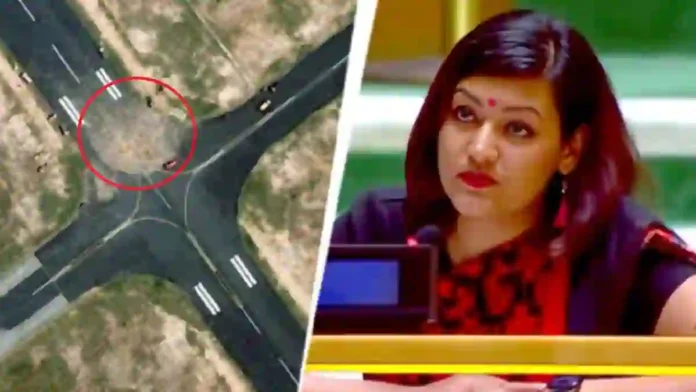India issued a strong rebuttal at the United Nations General Assembly (UNGA) on September 26 (local time), responding sharply to Pakistan Prime Minister Shehbaz Sharif’s address with accusations of hypocrisy, terrorism glorification, and misleading narratives. Petal Gahlot, First Secretary at India’s Permanent Mission to the UN, exercised India’s right of reply, calling Sharif’s remarks “absurd theatrics” while systematically dismantling Islamabad’s claims about the May 2025 escalation.
Gahlot directly addressed Sharif’s attempt to portray the damage inflicted on Pakistani airbases during the May conflict as a strategic win. She noted that Pakistan continued issuing threats until May 9, but following the devastating strikes by Indian forces on May 10, its military quickly sought a ceasefire.
Photographs of destroyed runways and burnt-out hangars, she highlighted, were available in the public domain, ridiculing Sharif’s framing of such destruction as a “victory.”
India also drew attention to Pakistan’s conduct at the UN Security Council earlier this year. On April 25, Islamabad protected “The Resistance Front,” a Pakistan-sponsored terror group responsible for the April 22 massacre of 26 tourists in Pahalgam, Jammu and Kashmir. Gahlot condemned Pakistan for shielding such outfits, arguing that its repeated attempts to glorify or justify terrorist groups revealed the true nature of its foreign policy.
The Indian side emphasised Pakistan’s longstanding record of duplicity in combating terrorism. Gahlot recalled Pakistan sheltering al-Qaeda leader Osama bin Laden for nearly a decade while simultaneously posing as a partner in the global war on terror. She added that Pakistani ministers themselves had admitted to operating terrorist camps for decades, exposing the hollowness of Islamabad’s counter-terror commitments.
Highlighting India’s recent counter-terror strikes during Operation Sindoor, Gahlot reminded the assembly that several Pakistani terror complexes in Bahawalpur and Muridke were destroyed, and many militants neutralised. Instead of acknowledging the consequences of hosting terror hubs, senior Pakistani civilian and military officials responded by glorifying and paying homage to notorious terrorists. Such behaviour, she argued, openly illustrated Pakistan’s deep-rooted patronage of extremist networks.
Read- US Getting Closer To Pakistan For Strategic Military Access Near China, Iran: Expert
Read- IAF Finalises Mega TEJAS MK-1A Deal, 97 New Fighters
Reiterating India’s firm position, the First Secretary underlined that New Delhi holds both terrorists and their sponsors accountable. She clarified that India’s actions were necessary to protect innocent civilians from cross-border terrorism. Stressing zero tolerance, she demanded that Pakistan shut down all terrorist camps and extradite wanted terrorists to India. Gahlot rejected any notion of intimidation through “nuclear blackmail,” stating firmly that India will continue to defend its people with decisive measures.
Responding to Sharif’s appeals for peace, India questioned the sincerity of Pakistan’s intentions. Gahlot argued that any credible attempt at peace would first require Islamabad to dismantle terror networks and end its support for extremist elements. She also criticised Pakistan’s domestic political discourse, which she described as replete with hate, intolerance, and bigotry, making its preaching at the UN ironic and unconvincing.
Closing her statement, Gahlot reaffirmed India’s long-standing position that all outstanding issues between India and Pakistan must be resolved strictly on a bilateral basis. She categorically rejected any scope for third-party mediation, underscoring this as a cornerstone of India’s national policy.
The Indian response at UNGA was firm, unapologetic, and heavily critical of Pakistan’s credibility, aiming to expose the inconsistency and duplicity in Islamabad’s international posturing while showcasing India’s stance of zero tolerance toward terrorism.
Based On ANI Report
Agencies




